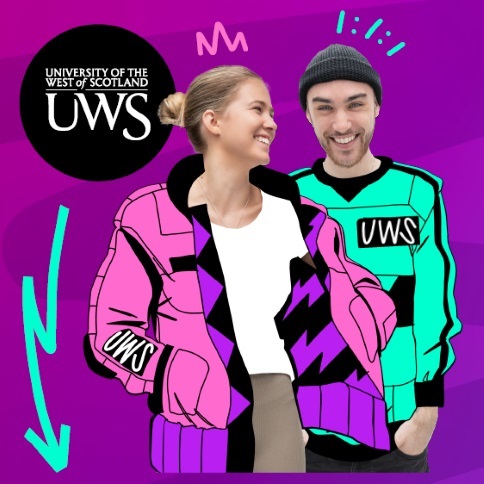Filmmaking & Screen Writing
Award
BA (Hons)
Duration & study mode
4 years full-time
School
Business & Creative Industries
Location
Ayr
Additional information
Ucas code
WW68
Course starting dates
-
Ayr: September
Our open days and information sessions are a great way to see what it’s like to study at UWS, and explore the options available if you’re considering student accommodation.
We hold open days and information sessions throughout the year aimed at students considering an undergraduate, postgraduate or postgraduate research degree at UWS.
Find out more about Open Days, Campus Tours and more
An you can find full information on how to study at UWS in 2024 here.
Find your place at UWS in 2024


The BA Filmmaking & Screen Writing degree offers you the opportunity to engage creatively and critically with all aspects of Film.
The practical focus of the degree will help you build up a portfolio of work and provide you with experience of pre- and post-production, research, scriptwriting and camera operation.
This programme provides valuable preparation for careers in the creative industries.
We welcome Scottish, UK and international students and consider all applicants on an individual basis.
Don’t worry if your qualifications are not listed here, we take a range of factors into account when assessing your application and are happy to consider other alternative combinations of qualifications and experience.
All applicants will be expected to submit a strong personal statement and reference. Applicants may be invited for interview.
* for more information on standard and minimum entry requirements, see the drop-down section below
For applicants whose first language is not English, the University sets a minimum English Language proficiency level. The qualifications below must have been gained within two years of the start of your course.
General English language requirements at UWS: International English Language Testing System (IELTS) Academic module (not General Training)
Exceptions to this level of IELTS scoring exist for some accredited or professionally-recognised courses (see section below for more details).
SOCIAL WORK DEGREES
For our BA (Hons) Social Work and MSc Social Work programmes, applicants are required to have an IELTS score as follows:
All stated English tests are acceptable for admission for both home/EU and international students for this programme:
For our research degrees (MRes, MPhil, PhD, DBA, DProf) applicants are required to have an IELTS score as follows:
For Health, Nursing & Midwifery courses that lead to, or require professional registration with the Nursing & Midwifery Council, applicants are required to have an IELTS or Occupational English Test (OET)*.
For such courses, the IELTS score is as follows:
* Note that the Occupational English Test (OET) will now be accepted in addition to IELTS as proof of a Nurse's English Language Competence (Nursing & Midwifery Council, 2019).
For our BSc (Hons) Applied Biomedical Science, BSc (Hons) Biomedical Science and MSc Advanced Biomedical Science programmes, applicants are required to have an IELTS score as follows:
For our Certificate of Higher Education courses, applicants are required to have an IELTS score as follows:
TOEFL IBT*: 78; no sub-test less than:
* Please note that TOEFL is still acceptable for admission to this programme for both home/EU and international students.
For international students, the Home Office has confirmed that the University can choose to use TOEFL to make its own assessment of English language ability for visa applications to degree level courses. We therefore still accept TOEFL tests taken in the last two years for admission to this programme.
West African Senior School Certificate of Education (WASSCE) including acceptance of WAEC Scratchcard*
*UWS will accept a WAEC scratchcard confirming that an applicant has achieved C6 or above as evidence of meeting English language requirement from Nigeria if the student graduated within the last 5 years. After 5 years applicants would be required to provide the WAEC Certificate.
Applicants who do not meet the minimum English language requirements have the option to study one of our preparatory and pre-sessional English courses. The UWS courses available are:
On our course pages, you will find details of our entry criteria listed as Standard Entry Requirements and Minimum Entry Requirements. These are the academic qualifications that, depending on your personal circumstances, you will be required to meet to allow your application to be considered for a place at UWS.
Competition for places on many of our courses can be very high and even if you meet the standard or minimum qualifications stated, there is no guarantee that your application will progress to the next stage of the admissions process. We review individual applications very closely and place great importance on your personal statement and academic reference as well as your academic qualifications before making selection decisions.
Our Standard Entry Requirements are the grades that you will need to achieve to allow you to be considered for entry to a specific programme of study.
Our Minimum Entry Requirements are applicable to those applicants who have not had an equal opportunity to demonstrate their academic ability at school or college and are known as ‘widening access’ applicants. We also sometimes refer to this type of applicant as receiving a ‘contextual’ offer. We may be able to provide you with a contextual offer if you fall into one of the categories below:
If you fall into any of the first four categories above, please mention this on your UCAS application. We will automatically apply category 5 if it applies to you.
If you have already achieved the required grades for either our standard or minimum entry criteria, we may be able to offer you an unconditional offer for some course areas. If you have not yet achieved these grades, we may be able to make you a conditional offer, which will rely on you achieving further qualifications before you can be accepted on to a programme of study.
The course combines three main strands. The first of these is practical and the focus is on developing competence in a variety of film production roles. The second is focused on screenwriting and developing confidence in presenting ideas on the page. The final strand is broadly focused on the study of film as an artform. This strand encourages students to develop research skills and use these to further develop their own creative development as budding filmmakers. The three strands are complimentary and inter-connected.
Many modules are taught by industry professionals, and you will use the latest digital film technology, television studios, and performance spaces. In recent years, students have benefited from masterclasses with internationally acclaimed writers, directors, producers, cinematographers, and editors. Whilst the programme is based at Ayr campus, it also benefits from having a teaching space at Film City, Glasgow, which is the hub for filmmaking activity in Scotland.
Introduction to digital filmmaking and screenwriting.
Develop your creative skills in the contexts of fiction and documentary production, and script-writing. You will also deepen your understanding of film theory.
Engage in more ambitious filmmaking and script-writing projects, developing a sophisticated appreciation of contemporary themes in cinematic theory and practice.
Complete a major research project in a specialist area of filmmaking of your choosing, and consolidate your understanding of film production.
UWS graduates work as directors, camera operators and editors. Independent productions herald a new era of growth for Scotland, broadening career opportunities. In addition to film and television production, graduates also work in journalism, marketing and management. Further study is possible at MA and PhD level.
Some graduates choose further study, leading to an MSc, PhD or teaching qualification. See list of courses available.
£1,820 cost per year of study (usually paid by the Scottish Government via SAAS*)
£9,250 Cost per year of study, but not more than £27,750
£9,250 Cost per year of study, but not more than £27,750
£15,500 per year of study
£305 per module (20 credits)
£1,550 per module (20 credits)
£1,550 per module (20 credits)
£2,580 per module (20 credits)
All UK and EU applicants for undergraduate study, not applying through an agent or partner, should apply through UCAS (Universities and Colleges Admissions Service)
The on-time application deadline for 2024/25 entry is 31 January 2024, 18:00 (UK time). For some courses it may still be possible to apply beyond this period, subject to suitable vacancies remaining. The final deadline for late applications via UCAS is 30 June 2024. Beyond this deadline, you may be able to apply via ‘UCAS Clearing’ if the course you are interested in has remaining places.
Please refer to our Undergraduate Application Guide for domestic & EU/EEA to find more information on when and how to apply to study at UWS.
Students from non-EU/non-EEA countries can apply directly to UWS via our dedicated online application system. The latest we can process your application is 6 weeks before the course start date to allow for visa processing times. For more information on when and how to apply to study at UWS please refer to our International Undergraduate Application Guide.
For part-time & online study, you should apply directly to the University through our online application system, not through UCAS. Please select the part-time mode of study when submitting your application. Before you begin your application, it is important to read the part-time application step-by-step guide for a smooth process.
To come to UWS as a visiting student on a study abroad or exchange programme, you must apply entirely through our online system.
An ATAS certificate is not required for overseas students applying for this course.
Do you have a question about applying for this course? Get in touch. We are here to help!
We will always try to make sure that we publish accurate course information but we do not accept responsibility for any mistakes or omissions. We will also try to make sure that we deliver our courses in line with our published information. However, we may not always be able to do so and you can find further information about this in our enrolment terms and conditions.